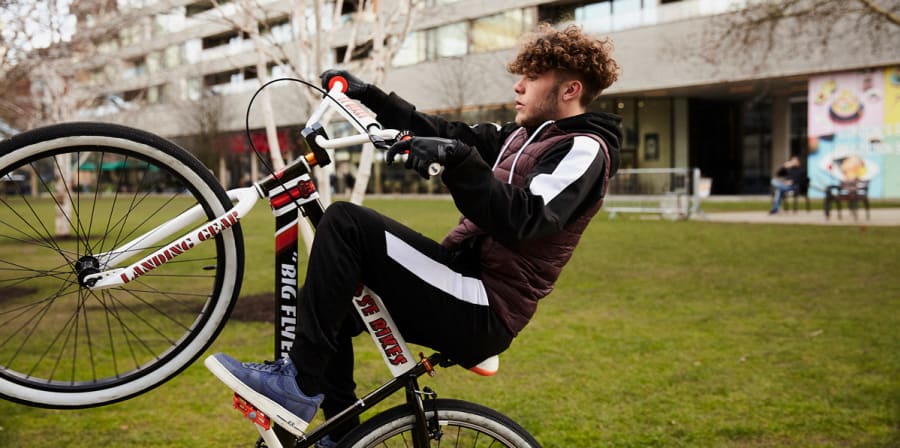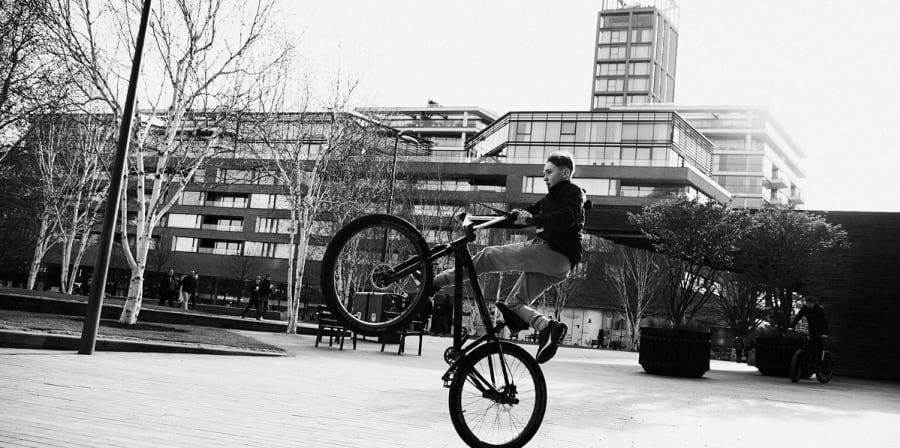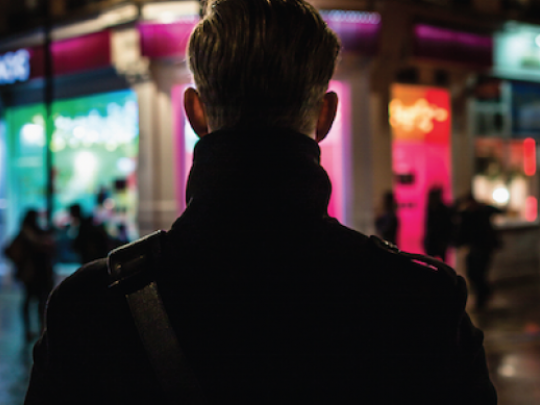Bikestormz is a youth-led social action organisation bringing young people together through bicycle riding, giving them a community and focus as an alternative to violent crime.
Since 2016 they have been living and riding by the motto ‘Knives Down Bikes Up’ in protest against knife-related violent crime in London and across the country. Bikestormz was the brainchild of Mac Ferrari, a reformed ‘roadman’ and Jake O’Neill, better known by his Instagram handle @jake100, where he boasts over 100,000 followers.
Ferrari, who has become something of an influential role model for young people started Bikestormz because he ‘was tired of seeing people glamourising a life of crime.’ After losing a number of friends to violent crime, either to murder or prison, he wanted to ‘tell the kids to put the knife down and do something more positive.’ Bikestormz has become a lifeline for many young people, mainly teenagers, but also children as young as nine, who say it has enabled them to look towards a ‘talent they can progress in and taken them away from a life they could otherwise be getting involved in.’
‘I see everyone as family,’ says Corrie, a 16 year old Bikestormz member from Dulwich, ‘if you know you’re in this movement and you know you’re down to be in that family, we’ll treat you like family.’ It’s this sense of community that makes Bikestormz appealing for young people like Corrie, that and ‘the adrenaline that runs in you…your adrenaline goes up and down like a heartbeat rhythm.’ The same adrenaline that Ferrari wanted to show his riders needn’t be found in the rush of committing crimes, they ‘can get the same buzz from riding [their] bike.’
‘When I go fast it just makes me happy, it puts me in a good mood, it can turn people from zero to hundred in seconds." – Kieran
‘When I’m doing a trick on a bike, I feel like that,’ says Corrie ‘the trick I’m doing could be the same trick the gang members would do but their trick, it could be ‘yeah, I’m getting away from the system, I’m getting away from the law.’
Bikestormz’ biannual ‘ride-outs’ see hundreds of bikers amass at a London landmark to ride through the capital’s streets together, bringing traffic to a standstill as they zig-zag through busy roads. If you aren’t in the know, the thrill-seeking riders with Bikestormz can look like a bit of a dangerous nuisance as they wheelie through the streets, fulfilling a stereotype that many Londoners associate with the type of violent crime that the organisation protests against. However, bike crews like these are a lifeline for their young members and the London Mayor’s office is fully on board, quoted as saying that ‘Bikestormz can bring together young Londoners and raise awareness that carrying a knife is not the answer.’
Their ride-outs attract thousands of riders from across the country and the Bikestormz community has a strict code of conduct that rules out violence and ‘rude or aggressive behaviour.’ Riders earn respect through mastering bike tricks and amassing a social media following and new members are welcome irrespective of age, race, status or location.

“These are different kids from different postcodes, but the bike is the glue. It’s the connection between different areas,” Ferrari says. “No one cares where you’re from when you ride. No one cares about the colour of your skin, they just care about riding. The minute the wheel is in the air, it’s a total mind block of anything going on in your life.”
Some Bikestormz riders have made it into the upper echelons, boasting vast social media followings and lucrative sponsorship deals with brands like Nike. Younger members like Alfie, 15 and Jay, 14, both from Essex (@alfie.33 and @oneway.jayb), aspire to ride full time and regularly post videos of their masterful wheelies and bike tricks on their Instagram accounts.
‘When I go fast it just makes me happy, it puts me in a good mood, it can turn people from zero to hundred in seconds’ says Kieran, 14 from Sussex (@oneway.kierann) whose Instagram videos of him riding front wheel in the air through London’s tunnels, car parks and back roads get thousands of views, ‘we’re all really close from riding, it’s like freedom.’
The statistics are undeniable and well-documented, violent crime, particularly among young people, is steadily rising across the country. 2019 has already seen the deaths of over 15 young people and in 2018, there were over 280 knife-related deaths in the UK.
The political and media focus is overwhelmingly reactive; the Metropolitan Police Commissioner, Cressida Dick has called for emergency stop and search powers for police under Section 60, which would enable them to search ‘suspects’ without reasonable cause and an online petition calling for harsher prison terms for those carrying knives, started by the family of murdered teenager Jodie Chesney, has already received over 100,000 signatures.
While this punitive rhetoric may be comforting to some, the line between victim and perpetrator in instances of youth violence isn’t always clear cut and tougher force and harsher punishments seem unlikely to change the culture of violence that gang membership fosters, a culture that is, at least in part, responsible for the surge in violent crime across the country. Local authorities are seeking to criminalise young people rather than take responsibility for their welfare and recognise that it is their vulnerability that leads them to carry knives or seek ties with local gangs for protection.

Research conducted by criminology expert Erin Sanders-McDonagh highlights that homelessness is also an issue faced by many young people in deprived areas; either their parents didn’t know how better to deal with their involvement in drugs or they have experienced a level of violence at home that made the streets a safer option. The organisation Action for Children reported that austerity measures have led to cuts in ‘budgets for children’s services, particularly services for children at risk of abuse and neglect, which dropped by 26% between 2015 and 2018.’ It is sad but entirely unsurprising then that young people are seeking belonging and community wherever they can find it.
To quell the rising tide of violent attacks amongst young people, the root causes of the issue need to be tackled. What leads a young person to violence? Why do they choose to affiliate themselves with a violent gang? And what alternative do they have? ‘That’s one thing that the media don’t see, gangs protect each other’ says Corrie, ‘all they want to do is make money, because the government isn’t giving them opportunities to have a good job and go to work instead.’
Bikestormz has filled a social gap that has been left empty by government austerity and ineffective protections for vulnerable young people. It’s organisations and movements like these that will be more effective in stemming the growth of violent crime across the UK than the punitive measures called for and enacted by the government. In his March statement, the chancellor Philip Hammond announced that he would be allocating £100m to the police force to help them tackle violent crime. While this will address some level of violence, if just half of this funding could be re-distributed to communities and local authorities and allocated to ground-level organisations like Bikestormz to support and increase their membership, it could begin to address the root causes of the issue and stop violence before it needed to be dealt with.
Words by Susheel Schroeder for Visible Justice.
Visible Justice takes place at London College of Communication from Wednesday 17 April to Friday 3 May 2019, and is free and open to all.
- Find out about London College of Communication's Media School
- Explore events at London College of Communication
- Follow LCC on Instagram to see behind-the-scenes at the College





